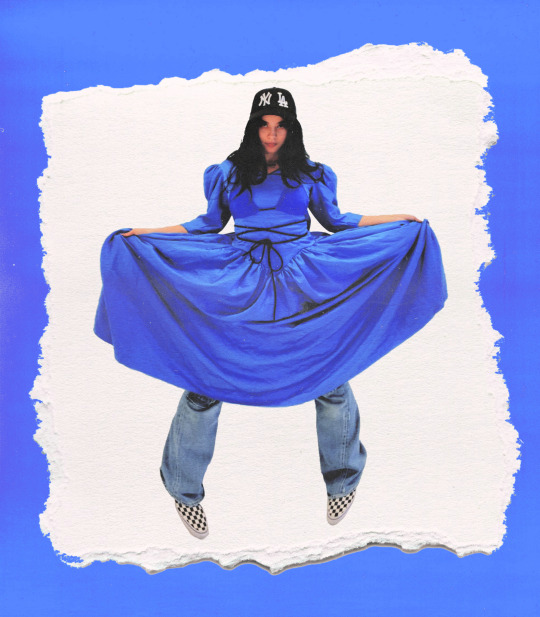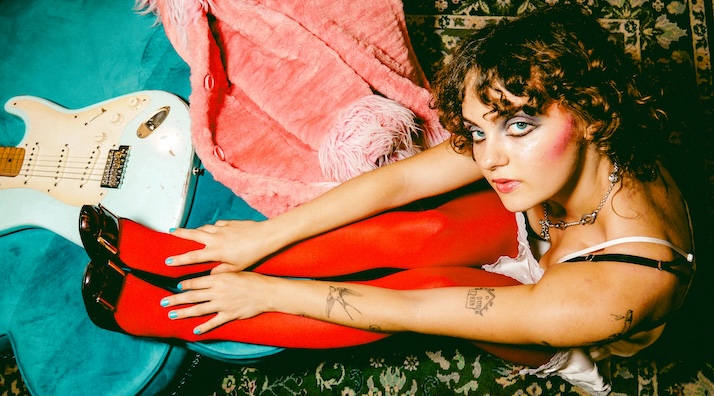THE BLOSSOM's '97 BLOSSOM' Flourishes at the Intersection of Joy and Pain [Q&A]

Photo: Connor Cunningham
Grunge, the sound of their dad belting demos in a home studio, rap, music videos playing on MTV, malleable synthetic production, falling down the rabbit hole of two decades worth of Internet-fueled music discovery. All of this and more can be found scattered throughout THE BLOSSOM's music. However, no bullet point list of inspirations and influences begins to fully encapsulate the novel yet familiar music of Lily Lizotte.
Today sees the release of their debut EP, 97 BLOSSOM, a painstakingly crafted love letter to their insecurities, inspirations, growing pains, and everything else that shapes them but presented in a form that at first glance may not be readily recognizable. And in many ways, that's the goal. At the heart of 97 BLOSSOM is a drive to reimagine the world - or more specifically, the world of Lily Lizotte - resulting in a debut that feels wholly timeless, perfectly unstuck from one singular period in time.
Shortly before the release of 97 BLOSSOM and their accompanying video for "BLACK EYE," I was lucky enough to speak with THE BLOSSOM over the phone about redefining self-love, moving beyond nostalgia, and what it really means to feel "HARDCORE HAPPY."
Ones To Watch: Who or what is THE BLOSSOM?
THE BLOSSOM: I am THE BLOSSOM. It is a project that I started about a year and a half ago. Before that I was just doing a lot of writing for other people, experimenting with different projects. Then I really brought this project into focus.
It's constantly developing and evolving. Right now, it's at its very exciting debut stage. I'd been developing it for a while in different people's studios, in my own studio, in my closet, in between New York, LA, and Sydney. I've carved out my own sound and my own language and really spent time with myself. So, the project sounds very autonomous and really exciting to me.
You mentioned carving out your sound. On your two singles leading up to 97 BLOSSOM, "HARDCORE HAPPY" and "SHAPESHIFTER," there's this amalgamation of MTV era '90s grunge nostalgia and forward-thinking genreless drive. How did you land upon your sound?
I'm obviously very influenced by the '90s and 2000s, grunge, and definitely shoegaze, but at the same time, I'm really influenced by a lot of rap. So, for me, it was how do I be influenced by what I'm influenced by but also surpass my own influences? I think that comes down to a lot of recontextualization. I'm inspired by a sense of warmth, nostalgia, familiarity, and things I grew up loving but how do I bring them to a forward space and take away that nostalgia timestamp? I think I do that by the facets of production, really blending facets of rap and more synthetic, electronic production with more familiar timestamped textures and sounds. For me, that really moves it into a timeless and genreless space where I can have a lot of fun and play around.
If you could have any one thing right now, what would it be?
It would be a hug from my mom, dad, brother, and my family because they're all in Australia and we're separated cause of COVID. I've always come between the States and Australia but because of the pandemic, I've been digging out a bunker for myself in LA. I'm so lucky I have such a great community of friends and collaborators that keep the fuel going through this project.
How do you combat that sense of isolation, both due to the pandemic and finding your footing in a new city?
New York is my home; it's where I carved out my own identity. It's culturally symbolic and influential. Sydney is where I feel grounded; I feel like a child. LA, for me, is where I come to create, and I can connect with people. It definitely feels disconnecting sometimes. My family is a huge part of my life, and them not being with me can feel really isolating at times, but I have such great collaborators that all I do in LA is my music. When you have such a strong purpose here, it keeps you going. All the people around me are constantly creating and sharing. I think that's definitely the medicine to feeling lonely or disconnected - that sharing aspect.
What's your earliest musical memory?
My earliest was probably when I was five or six. My dad has a recording studio at home - because we're all musicians in my family - and he would have writing sessions. I would hear him belting, screaming, and making demos. I would be fascinated with what he was doing and thinking how can that be my job?
I love that your passion for music stemmed from such a natural family dynamic.
Yeah, I heard him recording at home and now years, years later I'm recording at home in my own closet. That knowledge of he's always had a home studio and that knowledge of, "be autonomous, be adaptable, learn Ableton, learn Logic, learn Pro Tools, learn how to record yourself, learn how to collaborate and be open" has always been in my life. The second I realized all I needed was a laptop... that was freedom for me. It was a way out of my own head.
He really set you up nicely for the Internet generation of music discovery and creation.
He was always very encouraging. He knew I got all my music off YouTube and downloading stuff off the Internet. I still find a bunch of music on Instagram. That sense of self-discovery and finding communities through music online is really special.
How does it feel to be "HARDCORE HAPPY?"
(laughter) "HARDCORE HAPPY" to me is an embodiment of how straining and mentally exhausting it is to always be happy. It's a lot to always want to be happy. That's all we're trying to do, we're constantly seeking out things that will make us happier and happier. That's exhausting. I find myself always trying to work really hard to fuel my own validation and fuel my own medicine to my insecurities. It's taxing, and that's what "HARDCORE HAPPY" is about.
Speaking on the theme of seeking validation from outside sources, your previous single "SHAPESHIFTER" deals with feelings of insecurity, dysphoria but at the same time still manages to feel very triumphant. It's exhilarating and bittersweet.
That's a lot of the energy on my whole project. You'll see and hear that as a recurring theme - that duality of I am tired. I am exhausted from myself, other people. I feel disconnected. I feel a sense of gender dysphoria. I feel a sense of dissatisfaction, growing pains, instability, insecurity. I feel weighed down by mental health, anxiety, and depression. But I also feel this sense of hopefulness. My music and my project are where both those things meet. It's where joy and pain live parallel, symbiotically together. I think I'm achieving that in production as well, where there are different sound palettes that work against each other to live alongside each other.
What do you hope people take away from 97 BLOSSOM?
I really want this project to be theirs. Ultimately, it is introspective, and all of these things are essentially me, my narrative, and my story. I'm creating that narrative for myself and sharing it, but I also want it to be completely theirs. I hope it detaches from me and becomes theirs. That's the greatest thing to me.
I had to dig really deep and be really honest with myself, and I hope that in doing that it reaches a part of people inside of them and they feel like it was made for them. That it feels like it's them singing, that it's them making this music. I want the songs to become them.
How has the past odd year not only informed your EP but how you approach music?
The past year has allowed me to see how I can actualize my influences into feeling like a unique voice and sound for myself. So, my sound is really genuine. It's not a novelty; it doesn't feel like a fad. It takes inspiration without it being imitation. I really work hard at recontextualizing my influences and having these sounds put in a space that doesn't sound new because it's so revolutionary or any of those big fancy words. I'm not curing the world's issues; it's just me exploring myself and having fun. It's fun and it's grueling!
If there is one thing you could project out to the entire world on a psychic loudspeaker, what would it be?
HI! Please know that you're crucial and be kind and loving to yourself, because you are meant to be here.
Do you have any tips for self-love?
I think it's changing our perception and my own perception of what self-love is. Perhaps it is seeking validation from other people, places, and things. Perhaps it's a bit of a mix of everything. Self-love comes from self-awareness and accepting things that you're insecure about and embracing the things that you thrive off of. We all have those things. Self-love comes down to self-awareness and acceptance. Once you're able to do that, then you're able to live with yourself more. It becomes an easier place for love to form.
Who are your Ones to Watch?
Kenny Mason and Jelani Aryeh. 454 from Florida. And HVN.
What are you doing immediately after this interview finishes?
I'm actually going to catch up on demos that I need to track new vocals for, so I'm sitting in my closet. I'm at my laptop, and I'm ready. I'm going to have a swig of water and get right into it.



